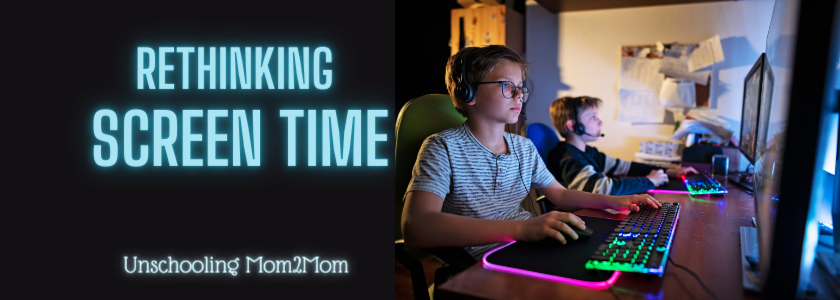Rethinking 'Screentime': Why It's Time for Parents to Shift the Conversation
Screentime.
The word is often used in a derogatory way, dismissive of all the possibilities that this technology offers.
And, it reflects poorly on the person using the word - it implies a lack of knowledge, a minimal knowledge maybe - kind of a cluelessness.
Because “screentime” can mean Television, tablets, phones, desktops. It can be found in your house, in your car, in your pocket.
I want to break it down some more, because I want you to stop using the term.
Breaking the Habit
Sometimes we use the word when we’re talking with other parents.
We refer to
“kids these days on their screens all the time.”
It’s almost a dog whistle to connect us with other struggling parents - a way we don’t feel so alone in parenting.
But it’s setting up an Us against Them scenario. And the "US" is you and other parents. Not an "Us" with your kids.
And that’s not going to help you if you’re trying to develop trust and encourage more connection with your child.
But that Parenting Peer Group Approval is strong - it’s a carryover from our school days of a more general peer pressure situation... always striving to be in the right crowd, win the teacher’s approval, conform to the group so you’re not ostracized.
So you may feel a little twinge when someone raises their eyebrow or gives a side-eye to that kid playing on their iPad nearby.
I want you to see that as an attempt for a connection with other parents (our peers) but
at the expense of the child.
Maybe even our own child.
If it’s someone else’s child, the parents may be trying to signal to each other
“I’m on top of this ‘problem’ we all know about,” and
“I’m not one of THOSE parents.”
Seeking approval.
And all of that is the opposite of trying to partner with your kid so you can help them navigate through life. You’re showing them who’s “Side” you’re on, when it comes to technology. And it’s not theirs. So… when they have a problem with it, you’re not going to be the person they turn to for help. You’ve set up a power struggle over it, and asking for help, recognizing a problem they’re encountering, wouldn’t be helpful to THEIR SIDE in the power struggle. That’s why I talk so much about being on Their Team, so to speak. Not the gatekeeper of all things they love.
Sometimes we use the term screentime when we’re talking to our kids. A way to shame them for their choices. A way to manipulate them to choose what WE want them to choose. And then, because we haven’t given it a lot of thought, we’ve minimized what they’re doing. The learning, the entertainment, the exploration - we’ve just dismissed it all.
A lot of unschoolers have talked about making a comparison to "Book Time."
Maybe some of you did hear,
“Get your head out of those books!”
Even if you did, though, reading a novel is narrow compared to all the things that can be happening as kids transition from one activity to another on the devices.
- They could be watching cooking shows to figure out new techniques or be inspired.
- Or looking up weather.
- Or watching disasters happening around the world.
- They could be chatting with friends, sharing artwork they’ve created, making plans and checking calendars.
- They could be looking at how much money they have available to buy that app they want,
- Or watching a video about why their dog is barking so much.
The opportunities to learn are endless. If you’re thinking,
“I wish they’d read a book like I did.” or
“I wish they’d ride their bike or build a skate ramp,”
They are not you.
And the world is not the same as it was 20 years ago.
Don’t glamorize the Old Days...sometimes we did those other things because we had no other options. Our kids have so many more options.
A while back, on the Unschooling mom2mom facebook group, long time unschoolers were discussthis and someone said,
"A computer, a hand held game, an iPod are doors that lead to a vast world of experiences. Just as your front door leads to a vast world of many different things you can do. Would you refer to all the things your family does by going through your front door—walks, shopping, visiting friends, mowing the lawn, vacations—as "door stuff"?
"Stop looking at the door. See the richness that exists beyond the door."
Another followed up with thinking of it as carrying dozens of magical doors in their pocket - all accessible wherever and whenever the need arises. And because of that perspective, our lives are bigger and richer and more connected for having a pocket full of magic doors. If someone wants to stay on their side of the door, so to speak, or lacks the imagination to see how the world is so much bigger - and more available... well, that’s ok.
Fear and conformity can make us play small.
My guess is that’s what’s happening
What Are Your Next Steps?
So, how to move past these limiting beliefs about technology.
- Think about the FUNCTION of what the phone, tablet, TV, desktop is being used for.
- Go on a Scavenger Hunt.
What are all things YOU do on your phone on a given day?
What other devices do you use that are electronic?
3.Get Curious about some of the things your kids are doing when THEY are on their devices.
Is there some overlap?
Are they doing some of the things YOU are doing, just at a kid level and with a kid’s version of interests/preferences?
Instead of asking how long they’ve been online, ask:
"what they’re working on?"
"What are they doing?"
"Who are they talking with?"
4. Read a little more on this
Screentime - Roxana Sorooshian writes about all the ways she uses her phone, tablet or desktop.
Limiting Your Child's Fire Time: A Guide for Concerned Paleolithic Parents. It was funny - and very applicable.











